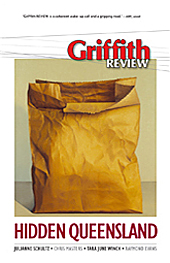Featured in

- Published 20080902
- ISBN: 9780733322839
- Extent: 296 pp
- Paperback (234 x 153mm)

Already a subscriber? Sign in here
If you are an educator or student wishing to access content for study purposes please contact us at griffithreview@griffith.edu.au
Share article
More from author

Remembering Roxby Downs
EssayIN 1842, THE mainly British and German settlers who had arrived en masse at the beginning of South Australia’s colonial history six years earlier...
More from this edition

The Olden Days – The Russian poet’s visit
ReportageThe story of the Russian poet's visit to Brisbane began with a dinner invitation from Kevin Windle, general editor and chief translator of the...

The Olden Days – The good ol’ days
ReportageWords are not meanings for a tree– Judith Wright, ‘Gum Trees Stripping' (1955) Queensland was a great place to grow up in. There were beaches,...

Justine and Col and Mr Heggarty
FictionThe mango trees are behind Mr Heggarty's milking shed. I can see them from the road, three dark cut-out shapes against the sky. I...